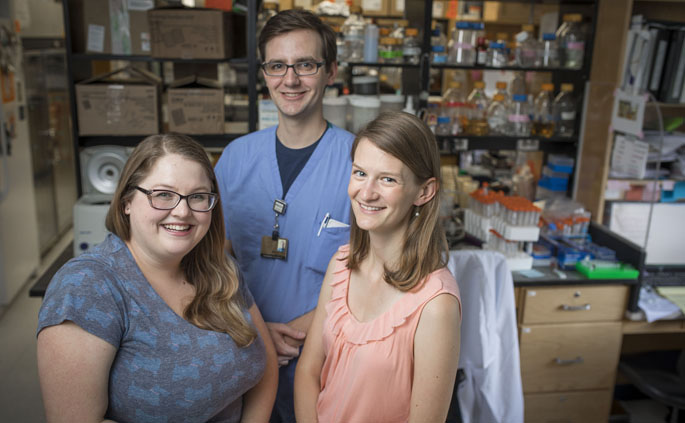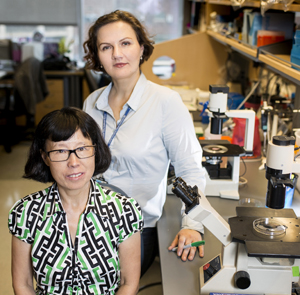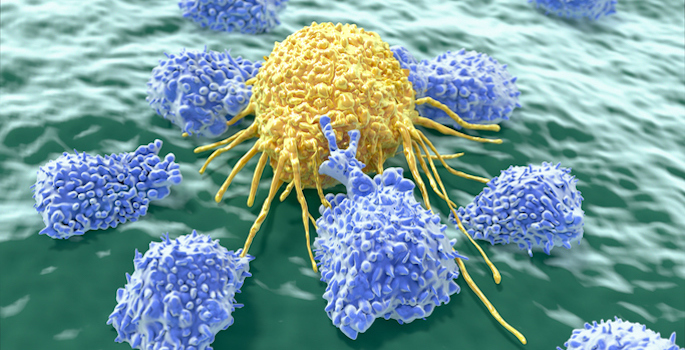Health And Medicine
-

Excess dietary manganese increases risk of staph infection in heart
Too much dietary manganese — an essential trace mineral found in leafy green vegetables, fruits and nuts — promotes infection of the heart by the bacterium Staphylococcus aureus (“staph”). Read MoreSep 21, 2017
-

Pancreatic islets study may spur diabetes treatment advances
Investigators in the Vanderbilt Diabetes Research and Training Center (VDRTC) and collaborators at Stanford University have discovered new insights into the molecular mechanisms of cell proliferation in juvenile human pancreatic islets, information that could lead to new treatments for diabetes. Read MoreSep 21, 2017
-

VUSN names Kleinpell assistant dean for Clinical Scholarship
Ruth Kleinpell, Ph.D., R.N., an internationally recognized nurse researcher, scholar and educator, has joined Vanderbilt University School of Nursing (VUSN) as assistant dean for Clinical Scholarship and professor of Nursing. Read MoreSep 21, 2017
-

Unique premed program teaches new approach to race and health
A premed program that teaches undergraduates about institutional racism is up and coming at Vanderbilt Read MoreSep 20, 2017
-

NSAIDs, genetics and miscarriage
A certain genetic variant, in combination with the use of anti-inflammatory drugs like aspirin and ibuprofen during early pregnancy, may protect women from miscarriage. Read MoreSep 20, 2017
-

Medication safety in the ICU
Facilitated reporting of medication-related events in the intensive care unit can provide opportunities for optimizing quality of care and patient safety. Read MoreSep 19, 2017
-

Inhibiting obesity
An enzyme in the gut – NAPE-PLD – is required for the action of signaling molecules that reduce food intake and weight gain. Read MoreSep 15, 2017
-

Acid reflux cancer link
Blocking acid reflux-induced production of reactive oxygen compounds may be a useful strategy for preventing DNA damage and decreasing the risk of esophageal cancer. Read MoreSep 14, 2017
-

Piano named to lead School of Nursing research program
Mariann Piano, Ph.D., a distinguished researcher in cardiovascular disease and expert on the effects of binge drinking and young adults, has been named senior associate dean for Research at Vanderbilt University School of Nursing (VUSN). Read MoreSep 14, 2017
-

Heat a trigger for seizures
Elevated body temperature alone can increase vulnerability to fever-induced seizures, even in the absence of infection or inflammation. Read MoreSep 6, 2017
-

Pain and Alzheimer’s disease
Clinicians should use a structured interview in people with Alzheimer’s disease to identify pain that might be otherwise overlooked. Read MoreSep 5, 2017
-

Restricting HIV-1 infection
Vanderbilt researchers are discovering ways that host proteins block HIV-1 infection, which could suggest new avenues for treatment. Read MoreSep 1, 2017
-

Pancreatic cancer development
Elevated levels of the factor G-CSF appear to promote the development of aggressive pancreatic cancer, suggesting a new therapeutic approach for this devastating disease. Read MoreAug 31, 2017
-

Study seeks to streamline validation of EHR data
Vanderbilt University Medical Center has been approved for a $1 million funding award by the Patient-Centered Outcomes Research Institute (PCORI) to study more efficient and feasible ways to validate electronic health records (EHR) and incorporate this information into medical studies. Read MoreAug 31, 2017
-

End-stage kidney disease study seeks to delay dialysis
Vanderbilt University Medical Center (VUMC) is studying the safety of a possible treatment for diabetic kidney disease that would delay or prevent the need for kidney replacement such as dialysis. Read MoreAug 31, 2017
-

Drug discovery efforts may lead to new Rett syndrome treatments
Vanderbilt University research-ers have relieved symptoms of Rett syndrome in a mouse model with a small molecule that works like the dimmer switch in an electrical circuit. Read MoreAug 24, 2017
-

Oxidative stress on the brain
Vanderbilt investigators have discovered that oxidative damage may play an important role in the development of a rare cholesterol synthesis disease and in the behavioral changes of autism spectrum disorders. Read MoreAug 23, 2017
-

Fatty acids and adenoma risk
Vanderbilt researchers have found that red blood cell membrane fatty acid content is associated with risk of having colorectal adenomas, with omega-6 fatty acids increasing and omega-3 fatty acids decreasing risk. Read MoreAug 21, 2017
-

Sugars in human mother’s milk are non-toxic antibacterial agents
A new study has found that sugars in mother's' milk do not just provide nutrition for babies but also help protect them from bacterial infections. Read MoreAug 20, 2017
-

Predicting brain surgery outcomes
Assessing brain functional and structural connectivity in patients with temporal lobe epilepsy may be a useful way to identify the best candidates for surgical treatment. Read MoreAug 18, 2017